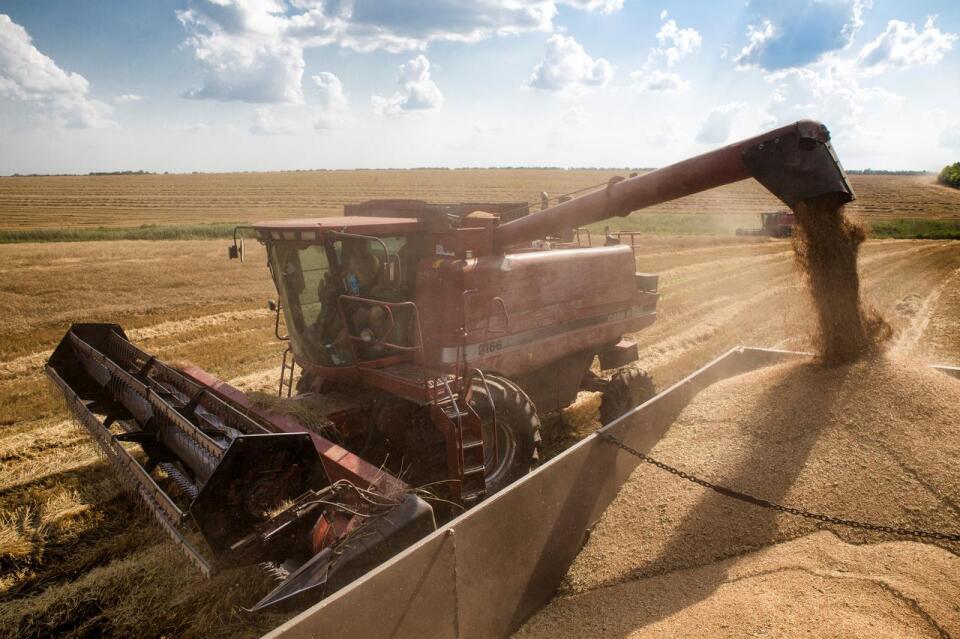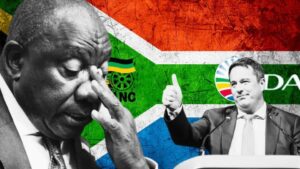Western-induced grain price crisis
By Muhammad Nooh Osman
Global grain and fertiliser prices have risen sharply recently to record highs not seen in a decade. Wheat prices rose 8.2 percent on the European exchange to €253.75 ($276.98) per tonne, with corn prices up 5.4 percent and rice prices jumping 19.7 percent, the highest since 2011, according to the UN’s Food and Agriculture Organisation (FAO).
The global food system is facing a severe crisis as grain and fertiliser prices soar to record levels in recent weeks. The crisis has been triggered by a combination of factors, including climate change, export bans and Western sanctions. But the main losers are poor countries that depend on grain imports for their food security and livelihoods, according to an expert.
Nourhan ElSheikh, an expert of the Valdai Discussion Club, professor of political science at Cairo University, and a member of the Egyptian Council for International Affairs, told Sputnik Africa that the crisis has multiple dimensions and causes.
ElSheikh cited a recent report by the United Nations Food and Agriculture Organisation that warned of the largest increase in global grain prices in more than a decade. She argued that the shortage of fertilisers has had a more significant impact on grain prices than the grains themselves, leading to a decline in production.
“Fertilisers’ prices have jumped faster than grain prices. That affected the availability of food, with the decrease in the production of corn, rice, soybeans, and wheat as a result of fertilisers’ shortage. This coincides with a sharp rise in the vegetable oil price index by 12.1 percent,” she said. “Such unprecedented swell in grain prices raised many concerns, not only in poor countries but in Europe and the whole world as well.”
The expert said that one of the main factors of such crises was the ban of white rice exports by India, which is the largest exporter of rice, contributing more than 40 percent of world exports. India’s decision was motivated by the impact of climate change and crop damage on its domestic production. This affected many Asian and African countries, who rely on Indian rice for their consumption.
Unfair Accusations
Another factor was Russia’s ban on rice exports, aimed at ensuring food security for its citizens and protecting its domestic market from overpricing in the wake of India’s ban.
“Nevertheless, Western media and politicians are trying to blame only Russia for the excessive rise in grain prices. They attribute the crisis to Russia’s suspension of the Black Sea Grain Initiative,” ElSheikh said.
Russia is a major exporter of wheat and other grains, as well as fertilisers. However, its role in the global food system has been hampered by Western sanctions and restrictions, which have targeted its agricultural sector and related services.
The International Monetary Fund (IMF) warned that Moscow’s withdrawal from the Black Sea Initiative, brokered by Turkiye and the UN at the start of the ongoing Russian-Ukrainian conflict, could push up grain prices by around 15 percent.
“In fact, the United States and European countries are primarily responsible for the crisis,” the Egyptian professor said. “The Grain Initiative has two parts, The Ukrainian grain exports, and the Russian ones. The first part was fully implemented, while the second part did not see the light due to political considerations related to the Western sanctions against Russia. Russian grain is the largest in size and has the pivotal role of combating the global grain crisis.”
ElSheikh said that Western countries have never fulfilled their obligations according to the initiative, with regard to lifting the restrictions imposed on the Russian Agricultural Bank, which obstructs the movement of Russian exports from fertilisers, grains and oils, as well as those imposed on insurance companies and ship services that deal with Russia.
“Russia extended the Grain Initiative agreement three times in the hope of fair and just implementation, but to no avail,” she noted. “Washington and Europe have insisted on implementing only what was relevant to Ukrainian grain exports, as it serves their interests.”
Beneficiaries vs Victims
The expert added that the EU was the main beneficiary of the grain initiative, having purchased 40 percent of the total 33 million tons of Ukrainian grain that came out within the framework of the initiative, known as the grain deal.
Moreover, ElSheikh argued that the rise in wheat price serves American interests, as the US is the second-largest exporter of wheat. She noted that the value of US wheat jumped by 8.5 percent, which is the highest ever.
“The poor countries are the main victims of the crisis. Those countries are not interested in the Grain Initiative, as they got less than 3 percent of the Ukrainian grain that came out. But they remain the most in need of Russian grain, and the most painful of the high prices of grain and fertiliser,” the political scientist explained.
Professor ElSheikh likewise stressed that Moscow has continued to ship grain to various countries around the world, including Africa, despite US and European sanctions and restrictions. She noted that in March, Egypt received the largest shipment of Russian wheat since 1986.
In addition, she emphasised that Russia has also taken the initiative to provide free grain and fertiliser to six African countries most in need.
“It is impossible to imagine the stability of the global market for grain and fertilisers without Russia, as it is the first source of them in the world. Russia has huge stocks of grain. It can export 60 million tons this year. That represents 20 percent of world grain exports, of which 48 million tons of wheat, 17.6 percent of the total world wheat exports.” – Nourhan ElSheikh
Way Out of Crisis
Professor ElSheikh said that the way out of the ongoing grain and fertiliser price crisis requires “progressive steps” forward from countries in the Global South.
She said the West could easily curb grain prices and stabilise the global grain market by responding positively to Moscow’s “fair demands” under the recently suspended deal.
Russia suspended its participation in the Black Sea Grain Initiative last month, citing the West’s systematic efforts to block Russian food and fertiliser exports and the fact that only 3 percent of Ukrainian grain exported under the grain deal actually went to needy nations.
“Due to the fact that the United States does not care about the fate of billions of peoples in Asia and Africa, the latter must move independently to save themselves. A number of measures are needed in cooperation with Moscow to overcome the problems of money transfers, payment, shipping and insurance,” ElSheikh said.
She referred to the Russian presidential decree issued on August 9, which allows foreign buyers to open special accounts in roubles or certain currencies in Russian banks for this purpose and use them in agricultural export settlement operations.
“Countries that seek to maintain their food security and protect their national interests must respond to this step and work alongside Russia towards a new global economic and financial system that is safer and more just for all,” ElSheikh concluded.
Lion finds happiness in Africa after ordeal and a lucky rescue in Russia
By Gleb Chugunov
In 2020, the paralysed lion cub Simba was brought to Russia’s city Chelyabinsk. Before, the small predator lived in an illegal photographer’s shed. The owners poured water on him and kept him in the cold. Russian activist and vet Karen Dallakyan performed an operation on Simba, after which he began to move.
The story of a lion cub rescued by a Russian activist and veterinarian, Karen Dallakyan, from illegal photographers three years ago has a happy ending. The animal is now reportedly living “in good health” on Tanzanian soil, even if its recovery and transfer were not easy, Dallakyan told Sputnik.
According to him, the former owner of the animal – Kilimanjaro Animal Centre for Rescue, Education, and Wildlife – was in arrears with their taxes and had been deprived of their licence.
For this reason, the animals transferred from Russia, Simba and another one, female leopard Eva, were moved elsewhere in Africa. Once the court has pronounced its sentence, they will return to the centre, he stated.
The veterinarian went on to talk about the difficulties he had encountered during the Covid-19 pandemic in transporting Simba from Dagestan (a Russian republic in the Caucasus), where the poor animal had been tortured, to Russia’s city Chelyabinsk.
Help Comes From Many Quarters
At the time, Aeroflot was the only airline to operate flights during the pandemic. Thanks to him, a passenger flight became a health flight, grateful Dallakyan stressed.
“The top brass at Aeroflot (Russia’s largest airline, ed. note) were understanding, as the transport had to be by passenger flight.”
Indeed, the poor animal, held in Dagestan by illegal photographers, had legs broken to prevent it from moving, and required several operations for numerous health problems.
Over the following year, the activists prepared the necessary documents to transport the lion to Tanzania. A sponsor found in Chelyabinsk agreed to organise everything, on condition that Dallakyan’s foundation would pay for the construction of an enclosure to house the little one on site. A Russian company provided the financing.
The Smiling Lion
That’s how the vet described Simba’s condition once he has arrived in Tanzania.
“The local food, air, humidity and dryness” quickly cured the animal, who found himself in his element,” the saviour said. “He’s happier than before”.
For his part, Hussein, Simba’s trainer in Tanzania, who takes care of him, says that “it was like a dream” for him.
At first surprised to see a different type of environment, Simba got used to it and is now happy, the trainer, who spends the whole day with him, playing right up to the time of the dinner, said.
According to him, Simba is now in good health, happier than before.
A year after his arrival in Tanzania, the lion has a girlfriend, named Fiona. They live in separate enclosures but are in regular contact.
This article was first published on Sputnik




